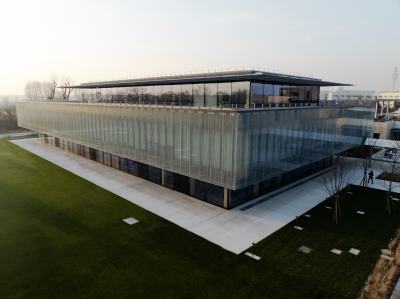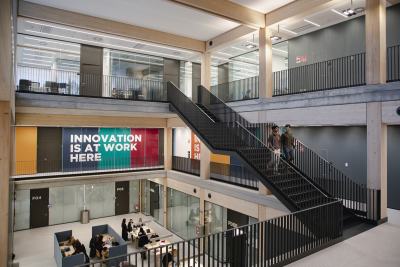Ten years of Humanitas University. The University enters the 2023–2024 Academic Year and inaugurates the Innovation Building
A mission driven by internationality and cross-discipline collaboration. A growth path that is now boosted by the addition of the Roberto Rocca Innovation Building, with classrooms, laboratories where users can experiment with innovative 3D printing techniques, state-of-the-art electronic microscopes and artificial intelligence, and spaces dedicated to the development of start-ups.
This morning saw the start of the 2023/2024 academic year of Humanitas University, which in 2024 celebrates the tenth anniversary of its foundation. Present at the ceremony were the Italian Minister of Health, Orazio Schillaci, the President of Lombardy, Attilio Fontana, the Mayor of Milan, Giuseppe Sala, and the Mayor of Pieve Emanuele, Pierluigi Costanzo.
The Lectio Magistralis “Precision medicine: lessons from the fields” was given by Prof. Mark A. Rubin, Director of the Bern Center for Precision Medicine and the Department for Biomedical Research at the University of Bern.
The ceremony was an opportunity to reflect on the history and future challenges of the University, founded on the outskirts of Milan in a strategic location, just a stone’s throw away from the Humanitas Research Hospital and research centre, where over 500 scientists work. Today, more than 2700 students are enrolled in Humanitas University’s seven degree and postgraduate courses. These are: a degree programme in Medicine & Surgery, in English; MEDTEC School, in English, designed by Humanitas University in collaboration with the Politecnico di Milano with the aim of integrating and enhancing the typical surgical skills with the basic and applied skills of Biomedical Engineering; a degree programme in Physiotherapy; a degree programme in Nursing, also taught in Bergamo, Castellanza and Catania; a Master of Science in Nursing and Midwifery; a degree programme in Biomedical Laboratory Techniques, and a degree programme in Medical Radiology Imaging and Radiotherapy Techniques. The latter two three-year degrees were introduced in 2023. Over 1400 people have graduated or obtained a post-graduate degree from the University.
“Humanitas University is an adventure that began ten years ago in a field and today reconfirms its drive towards the future,” says Gianfelice Rocca, President of Humanitas. “We want to be a centre where the new forms of intelligence, digitisation and robotics, are at the service of physicians and patients. Our university is one corner of a sustainable knowledge triangle: the other two are the Humanitas hospitals, which last year treated 1.3 million patients and were recognised by Agenas [Agenzia nazionale per i servizi sanitari regionali – the Italian national agency for regional health services] for their high clinical quality; and research, which aims to have a concrete impact on medical progress and improve treatments for everyone.”
With Humanitas University’s globally renowned teaching staff and a visiting faculty that also includes Nobel Prize winners, today more than 40% of the students enrolled in its degree programme in Medicine & Surgery are international. This growth path is recognised by the Times Higher Education World University Rankings (THE), which places the University among the top 300 universities in the world and in the top 151 to 175 best medical universities; and by the CWTS Leiden 2023 ranking, which sees the University ranked first in the EU and 23rd worldwide for its percentage of scientific publications.
The University’s tenth year also marks the beginning of Prof. Luigi Maria Terracciano‘s rectorship. “Life sciences are experiencing an era of accelerated evolution, with technological development, artificial intelligence and precision medicine,” says Luigi Maria Terracciano, rector of Humanitas University. “However, this progress must not make us forget the essential role of human beings. We have a clear vision for the next 10 years: we will work to build cutting-edge infrastructures that support our mission, creating innovative academic programmes and designing new courses suited to the challenges that the future will bring. We will increase our competitiveness on a European and international level, offering spaces for intercultural dialogue and promoting research that contributes to scientific progress and community care. On the tenth anniversary of Humanitas University, the Roberto Rocca Innovation Building aims to provide exactly that: a place of teaching, research, innovation and cross-discipline collaboration, at the heart of which is the care of people with health problems.”
Roberto Rocca Innovation Building
Humanitas University’s response to the challenges ahead is the Roberto Rocca Innovation Building: a home where ideas can grow and be stimulated, and where students can be helped to put them into practice in synergy with the hospital, the research centre and the corporate world. It is a 6000 m2 start-up incubator, where people can push the boundaries of microscopy, 3D printing and artificial intelligence. The structure is also designed to meet the needs of MEDTEC students.
The Innovation Building is named after Roberto Rocca, one of the founders of the Techint Group, which is firmly committed to the promotion of innovation and scientific culture. The building expresses the integration between medicine and engineering both architecturally and in the way the spaces are organised: advanced 3D printing and electron microscopy laboratories enjoy a setting that promotes knowledge exchange and communication between students and teaching staff from different disciplines. The building is also home to the Humanitas AI Center, where physicians, researchers, data scientists and engineers work together to identify new diagnosis systems, ensure increasingly personalised treatments, augment the speed and precision of procedures, and help hospitals to treat and support patients better.
The structure, designed by architect Filippo Taidelli, was created to fit in harmoniously with the other buildings on the Humanitas University Campus while retaining its own innovative identity.
The Innovation Building has been built according to modern parameters of environmental sustainability. Thanks to its virtuous approach to energy performance, the building has obtained LEED Gold Certification, the global standard for environmentally friendly buildings and an internationally recognised mark of excellence. The structure also received the Wood Architecture Prize by Klimahouse, which rewards energy-efficient architectural works made of wood – buildings destined to become a benchmark for the international criteria imposed by the pressing challenges presented by climate change and environmental sustainability.


